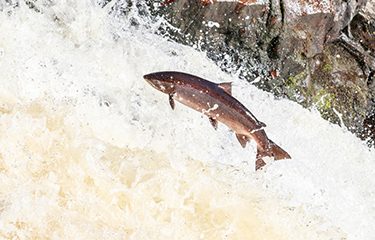Scotland’s salmon catches reached the lowest level on record in 2018, according to new figures published by the Scottish government.
The “Salmon fishery statistics: 2018” report confirms that in the rod and line fishery, a total 37,196 wild salmon and grilse were retained and released last year, representing just 67 percent of the previous five-year average. At the same time, the reported catch and effort for the fixed engine and net and coble fisheries were among the lowest recorded by either fishery since records began in 1952, with 3,751 wild salmon and grilse caught and retained. The latter was from a reported effort of 25.5 crew months.
Commenting on the statistics, Scottish Environment Secretary Roseanna Cunningham said the decline in wild salmon numbers was of great concern and that she was determined to safeguard the future of the species.
“The problem is down to a range of complex factors, many of which are [out of] our control, including the unprecedented water shortages Scotland experienced last summer,” she said.
Such low flows are known to be difficult conditions for anglers catching fish, and salmon have been shown to delay entering rivers until flows increase, which can be toward the end of the fishing season.
“We have identified 12 groups of high level pressures on the species, and we’re working closely with key partners to address these,” Cunningham said.
Last year, the government committed GBP 500,000 (USD 643,920, EUR 578,408) to fund research to better understand the problem and mitigate against it. It’s also providing around GBP 5 million (USD 6.4 million, EUR 5.8 million) a year to remove barriers to fish migration in rivers around Scotland.
“I’d also like to highlight the conservation efforts of Scotland’s anglers last year, who returned such high numbers of the salmon they caught,” Cunningham said.
In light of the findings, the salmon body Fisheries Management Scotland is calling for salmon conservation to become a national priority. The organization’s Chief Executive Dr. Alan Wells said the figures for 2018, taken together with those of recent years, “confirm this iconic species is now approaching crisis point.”
He acknowledged that some of the factors impacting on wild salmon stocks may be beyond human control, but that Scotland’s government and regulatory authorities now have “a historic opportunity” to do everything in their power to safeguard the species in those areas where they can make a difference.
“We are calling on all regulatory authorities urgently to place a renewed emphasis on the crucial importance of salmon conservation,” Wells said. “There are many examples where positive interventions have already helped, but more must be done. This will require Scottish government and agencies to coordinate their efforts to protect salmon in a way that really isn’t happening currently.”







